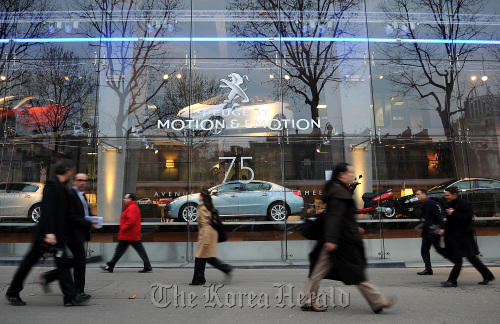Volkswagen AG, PSA Peugeot Citroen and other European automakers may be forced to halt production in coming weeks as component suppliers in earthquake-ravaged Japan struggle to restart factories.
The recovery to normal production levels may take months and cost the industry “billions of euros” in lost revenue, said Lars Holmqvist, head of the region’s Clepa auto suppliers association in a telephone interview from Brussels Thursdayday.
“This will cause disruptions in Europe without question,” said Holmqvist, whose group represents more than 3,000 companies. The effect on the carmakers will probably be felt in the next few weeks as local supplies of Japanese parts such as semiconductors and infotainment systems dry up, he said.
Production of some Peugeot and Citroen models will fall as much as 60 percent because of a shortage of diesel engine parts from Hitachi Ltd., Peugeot, Europe’s second-biggest automaker, said March 23. General Motors Co.’s Opel unit this week canceled shifts at plants in Germany and Spain before finding a new source of electronics components in the U.S.
Some 40 auto-parts makers in Japan remain hampered after the nation’s record earthquake damaged factories and transport routes, said Carlos Ghosn, chief executive officer of Renault SA and Japanese partner Nissan Motor Co. More than 9,800 people have died in the country, which is also facing electricity shortages after a nuclear-power plant was crippled.
Global auto output may drop by about 30 percent if parts plants affected by the quake don’t return to operation within six weeks, said Michael Robinet, vice president of Lexington, Massachusetts-based IHS. Most major automakers will experience disruptions by mid-April because supply networks are intertwined, Robinet said yesterday.
 |
Pedestrians pass the PSA Peugeot Citroen company headquarters in Paris. (Bloomberg) |
German automakers have begun inquiring about government support for workers if they halt assembly lines because of missing components from Japan, said Anja Huth, a spokeswoman for the Nuremberg-based Federal Labor Agency.
“The requests are coming from auto manufacturers because the situation is increasingly tight,” Huth said yesterday.
The agency, which subsidizes pay if economic conditions force a slowdown, has determined the effects of the earthquake are a valid justification for shorter workweeks, she said.
Ford Motor Co.’s European unit, based in Cologne, Germany, hasn’t ruled out applying for short-time work, said spokesman Adrian Schmitz.
“It all depends on how the situation develops,” Schmitz said by phone. Ford is in close contacts with suppliers, and a shortage of components from Japan hasn’t disrupted production so far, he said.
A parts shortage from Japan would have ripple effects on other suppliers because missing parts would delay sales of other components they assemble, said Clepa’s Holmqvist.
“Most of the items from Japanese suppliers are something unique, so substitution is that much more difficult,” he said, estimating that suppliers in the country are operating at 60 percent capacity.
Autoliv Inc., the world’s largest producer of automotive seatbelts and airbags, has resumed limited production in Japan as some carmakers in the country have started operating again, Chief Executive Officer Jan Carlson said.
“Some production lines are operating at 50 percent, and for some lines it’s less,” Carlson, who returned to Sweden this week from a three-day visit to Japan, said in a telephone interview. Autoliv suffered only ”cosmetic damages” to Japanese factories, he said.
“The factories are back to the way they were before the earthquake, you don’t notice anything on the production equipment,” Carlson said from his Stockholm headquarters.
Volkswagen, Europe’s biggest carmaker, will maintain production through this week, said Christoph Adomat, a Wolfsburg, Germany-based company spokesman. He declined to comment beyond that.
Robert Bosch GmbH, the world’s biggest parts-maker, can’t predict whether it will be able to secure component supplies beyond the end of next week, said Christoph Zemelka, a spokesman for the Stuttgart, Germany-based company. Electronics components are the scarcest, he said.
Continental AG may face supply shortfalls in certain areas, Katja Mattl, a spokeswoman for the Hanover, Germany-based company, said by phone. The manufacturer of engine parts and braking systems has secured parts for the next three to four weeks and is working on long-term access, she said.
Volvo Cars, the Swedish carmaker owned by China’s Zhejiang Geely Holding Group Co., has been able to secure its production through next week, spokesman Stefan Elfstrom said. Volvo gets about 10 percent of components from Japan. It has about 30 Japanese suppliers, including seven based in the most damaged areas, he said. (Bloomberg)





![[Exclusive] Hyundai Mobis eyes closer ties with BYD](http://res.heraldm.com/phpwas/restmb_idxmake.php?idx=644&simg=/content/image/2024/11/25/20241125050044_0.jpg)
![[Herald Review] 'Gangnam B-Side' combines social realism with masterful suspense, performance](http://res.heraldm.com/phpwas/restmb_idxmake.php?idx=644&simg=/content/image/2024/11/25/20241125050072_0.jpg)

